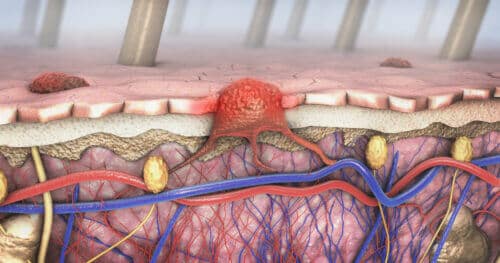Researchers at the Rapaport Faculty of Medicine at the Technion present a new approach to overcoming resistance to anticancer drugs

Researchers at the Rapaport Faculty of Medicine present a new approach to overcoming the development of resistance to anticancer drugs. The study, which focused on the aforementioned resistance mechanisms in melanoma, was led by the research group led by Prof. Amir Orin from the Integrated Center for Cancer Research at the Rapaport Faculty of Medicine and Dr. Emily Avitan-Hersh from the Rapaport Faculty of Medicine and the Dermatology Department at Rambam (as part of a doctoral thesis) In collaboration with Prof. Zeev Ronai from the Sanford-Burnham Institute in California.
The current study, published in an article in the Journal of Investigative Dermatology, spanned the entire spectrum between research and the clinic - from the single molecule to experimental systems in tissue culture, from them to model mice to clinical treatment.
Melanoma is the deadliest type of skin cancer, and in the US alone, approximately 2020 people, most of them men, are expected to die from the disease during 6,850. In many cases, the disease results from a mutation in a gene called BRAF, which leads to overactivation of an enzyme that accelerates cell division. Today there are already drugs that inhibit this enzyme and thus slow down the development of melanoma, but the effectiveness of these drugs has decreased due to the development of resistance in cancer cells. This resistance is due, among other things, to a failure in the ubiquitin system - a system whose discovery in 2004 earned Professors Avraham Hershko and Aharon Chachanover of the Technion the Nobel Prize in Chemistry.
The ubiquitin system is responsible for the breakdown of disordered proteins and cancer-causing proteins - a breakdown that is essential for the normal functioning of the body. The problem is that the cancerous tumor knows how to harness the proteins from the cancer-causing organisms for its needs, partly through an enzyme called RNF4. In a previous study, Prof. Orin discovered that RNF4 supports cancer-causing cells. Moreover, he showed that the removal of the enzyme in different types of cancer cells does damage the tumor and shrink it.
Now the researchers discovered that the activity of this enzyme depends on a protein called eIF2α. The research findings show that first, an increased level of RNF4, which is not characteristic of benign skin tumors, characterizes approximately 40% of melanoma patients; And secondly, a high level of RNF4 helps the tumor to create resistance to drug treatment.
Using genome engineering (gene editing), the researchers showed that eIF2α is essential for the cancerous activity of RNF4, increases its stability and plays a particularly important role in the development of drug resistance. As a result, they estimate that inhibition of eIF2α will pave ways to overcome the problem of resistance and enhance the effectiveness of the aforementioned drugs.
The participants in the study were graduate students Yaman Abu Ahmed and Avital Oknin Wiseman from the Orin Laboratory and pathologist Dr. Yaniv Zohar. The study was supported by the Wolf Foundation, the Payne Foundation, the Atidim Research Grant, the National Cancer Institute (NCI), the Israel Cancer Research Foundation (ICRF), the Israel Germany Research Foundation (GIF) and a cancer research grant from the Flinkman family from Randi.
Prof. Orin is the head of the Stan and Ruth Flinkman Laboratory for the Study of Genetic Networks at the Rapaport Faculty of Medicine and a member of the Integrated Center for Cancer Research at the Technion (TICC).
Dr. Emily Avitan-Hersh is a lecturer at the Rapaport Faculty of Medicine, a member of the Translational Research Institute (CRIR) and deputy director of the dermatology department at the Rambam Medical College.
for the scientific article
More of the topic in Hayadan:
